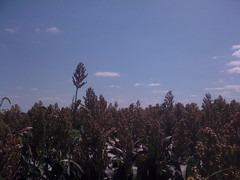The World Food Prize, an award set up by Norman Borlaug to honor others who fought against hunger, was held in Des Moines this week.* The prize went to Gebisa Ejeta, an Ethopian-American plant breeder and geneticist, who developed new breeds of sorghum that increase yields as much as fourfold.
His sorghum breeds deal better with drought, a trait that will become only more important around the world as competition for fresh water increases. Perhaps even more importantly though, they are resistant to striga**, a parasitic weed that attaches to the roots of crops, drawing off nutrients and severely decreasing yield (20-80% less than uninfected fields). Each plant produces tens of thousands of tiny seeds than can lie dormant in the soil for up to twenty years waiting for the best moment to strike, so once a field is infected with striga, it isn’t going away. The common name for striga is witchweed which fits the species perfectly. Striga resistant sorghum is a very good thing.
My appreciation and congratulations go out to Gebisa Ejeta.
*This is the first time the prize has been awarded since Dr. Borlaug passed away.
**On the more basic research side, the study of striga lead to the discovery of a new class of plant signaling molecules strigolactones.
